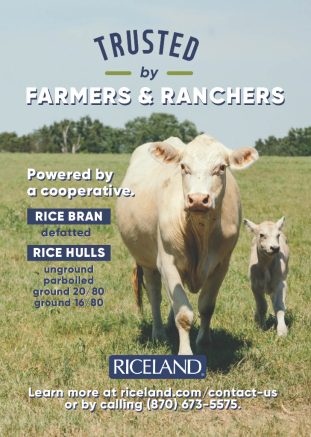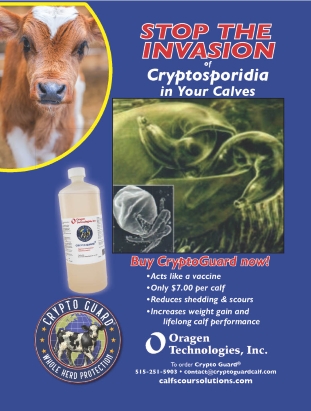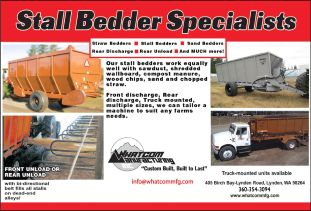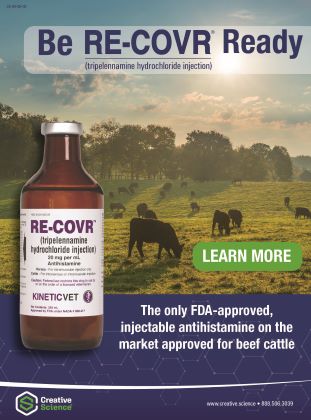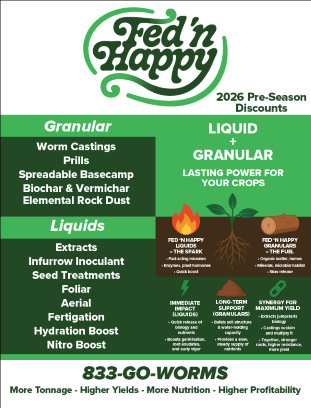The Evolution of Colorado Serum
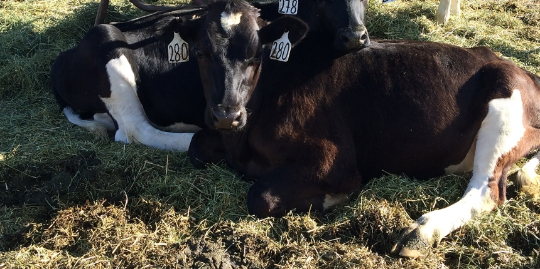
The Evolution of Colardo Serum
Colorado Serum Company’s story begins in January of 1923 on a plot of land close to the Stock Yards and coliseum in Denver, CO. Originally called the American Serum Company, the small facility was started by veterinarian Dr. J.N. Huff in order to produce an antiserum to combat the deadly and highly-contagious hog cholera virus – also known as Classical Swine Disease. Colorado was chosen due to the thinking that the high altitude would provide the donor hogs with richer blood for a superior protection.
There were hundreds of serum producing companies across the United States in the early 1900’s, however, many were forced to sell or close their doors during the great depression. Colorado Serum nearly closed down as well had it not been for the occurrence of a timely outbreak of hog cholera. Since the company happened to have one of the only large supplies of antiserum on hand it was spared from the devastating economy.
Hog Cholera was eventually declared eradicated in the late 1960’s. Over these decades the company expanded its production of vaccine and serum products as well as adding veterinary instruments acquired from the Western Instrument company in Chicago during the 1960’s. The plant’s physical footprint also continued to grow to the roughly 25 acres it encompasses today.
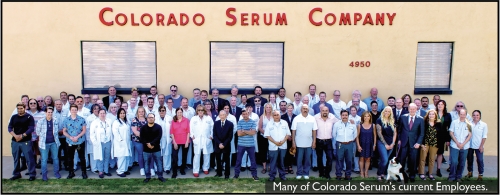
Family Timeline
Colorado Serum founder Dr. J.N. Huff passed away unexpectedly at the age of 43 due to appendicitis, leaving his wife, Mabel, and only child, Majon, with the difficult decision of what to do with the company. After numerous unsuccessful attempts to sell, Majon made the choice to drop out of Northwestern University and move back to Denver to take the reins at Colorado Serum – a role he dutifully and skillfully embraced for the next 75 years until his passing in 2010.
Majon and his wife Shirley had one son, Joe, who literally grew up at Colorado Serum – working daily side by side with Majon and eventually earning the position of CEO in the 1980s. Today, Joe is still CEO and the family ownership has expanded to include his wife Cheri, their two sons David and Daniel as well as David’s wife Natalie. The company operates with roughly 90 employees and always, throughout its history, with at least one dog. Brody and Chewie are the current Colorado Serum mascots.
Progress through the years
While hog cholera antiserum was Colorado Serum’s sole launching product, the company has ventured into many other areas of veterinary medicine including vaccines against viruses, bacterns and toxoids as well as laboratory reagents. The company is probably best known today for the production of RB-51 – a vaccine to protect cattle against Brucella Abortus. Colorado Serum was chosen by the USDA to be the manufacturer of the vaccine in order to institute an eradication program for the disease – an effort so effective and successful that it has been adopted by numerous countries around the world. While Brucella Abortus has essentially been contained in the United States, RB-51 is still widely used due to wildlife that can easily contract and spread the disease to nearby cattle operations, especially around the Yellowstone area.
Within the veterinary biological industry, Colorado Serum is also known as a producer of difficult to make medicines as well as niche products that don’t meet the lucrative requirements of the large corporations but are still vital to animal health. In fact, Colorado Serum is the sole U.S. manufacturer of not only serum antibody products and RB-51, but a host of others such as anthrax and wart vaccines. Bovi-Sera is a unique product used for short term protection for cattle against a variety of diseases – using serum from cattle that have been hyperimmunized with E-Coli, Pasturella multocida type A, Salmonella and more. Also distinct to Colorado Serum is that it provides more products labeled specifically for sheep and goats – including essential protection from tetanus and enterotoxemia – than any other company. All of which are made at no other location than the original facilities in Denver.
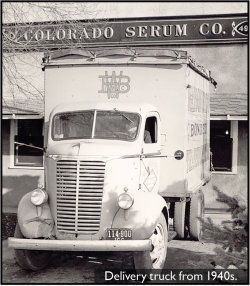 Challenges
Challenges
While being the only manufacturer of a score of products would seem like a huge advantage for a business, that reality has presented some challenges for Colorado Serum. True there have always been buyouts and consolidation within the animal health industry, but the last 20 years has seen so many mergers and acquisitions that the production field has narrowed to a handful of “super companies” and a few small ventures that lack substantial production capabilities.
This does offer the rare mid-sized company like Colorado Serum a unique opportunity to produce products that are too cumbersome for a smaller firm and not profitable enough for a major one. However, at times the company has been in a difficult position of being unable to provide enough of its offerings to satisfy the demand of the entire market. This is especially the case with its serum-based products. Due to the complexity and expense of growing in host animals, all other companies have dropped serum products over the years as they look to cut costs and focus more on high-earning and large-volume medications.
Backorder and Requirements
Colorado Serum has been in an ongoing and unforgiving back order situation with its Tetanus Antitoxin and C&D Antitoxin production for years. The efforts to climb out of the hole are hampered by several factors such as the large amount of space required to house and care for the animals. One hundred years ago, Colorado Serum was largely surrounded by open land but is now considered to be on the doorstep of downtown Denver. Given the small margins on serum products it is not financially feasible to simply purchase more land and build more facilities.
Additionally, as mentioned, these products can be aggravatingly difficult to make. Production requires a significant amount of titers (the concentration of antibodies in the serum) from the donor animals to be efficacious and what causes them to rise or fall has baffled experts since serum making began. Coupled with ever-mounting (and often excessive) requirements imposed by government agencies which oversee animal health companies and their products, answers to effectively supplying the industry are elusive and few and far between.
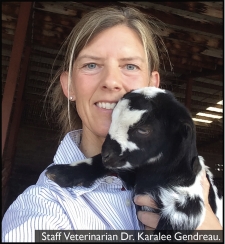 Moving Forward
Moving Forward
The ethos at Colorado Serum has always been one of hard-work, fairness and a dedication to animal health above profit. It is because of these tenets that the company survived the untimely death of its founder, J.N. Huff as well as the absence of Majon Huff’s leadership during his service in WWII. These principles are also at the root of decisions over the years to stick with products that are essential to the industry but would have otherwise been abandoned long ago because they weren’t financial windfalls. With these foundations in place, Colorado Serum’s future depends on a certain evolution – constantly working on making products more readily available without compromising effectiveness, safety or affordability.
In the case of serum products, the company has enacted numerous efforts to bolster production (some of which are just now coming to market, such as the increased availability of Tetanus Antitoxin through the use of a USDA option that allows the release of additional product with a shorter expiration date). Other, more ambitious ideas are also in motion such as replacing the serum products with monoclonal antibodies grown in a laboratory setting as opposed to animals. Efforts such as these do not come quickly or cheaply, but Colorado Serum is nonetheless determined to see solutions through in order that the market is well supplied.
Summary
New products on the horizon are the results of partnerships with young companies looking to bring their scientific breakthroughs to life but are in need of greater manufacturing capabilities. Additionally, often other well-established firms will approach Colorado Serum to provide them with challenging products that they’d rather not make themselves – thus ensuring that these essential vaccines and treatments stay available to the end user.
Colorado Serum is a family business in more ways than one. Extended families make up a large part of the company’s employment – working alongside each other with a belief in what they do matters. An understanding that their work saves animal’s lives. These employees and the many that came before them are the reason Colorado Serum has not only survived for 100 years, but has risen to meet the countless challenges over its history and will no doubt overcome those which it faces now and whatever is to come.
April 2024
Article courtesy of David Huff.
For Leading Industry News in the Cattle Field: Home – American Cattlemen



